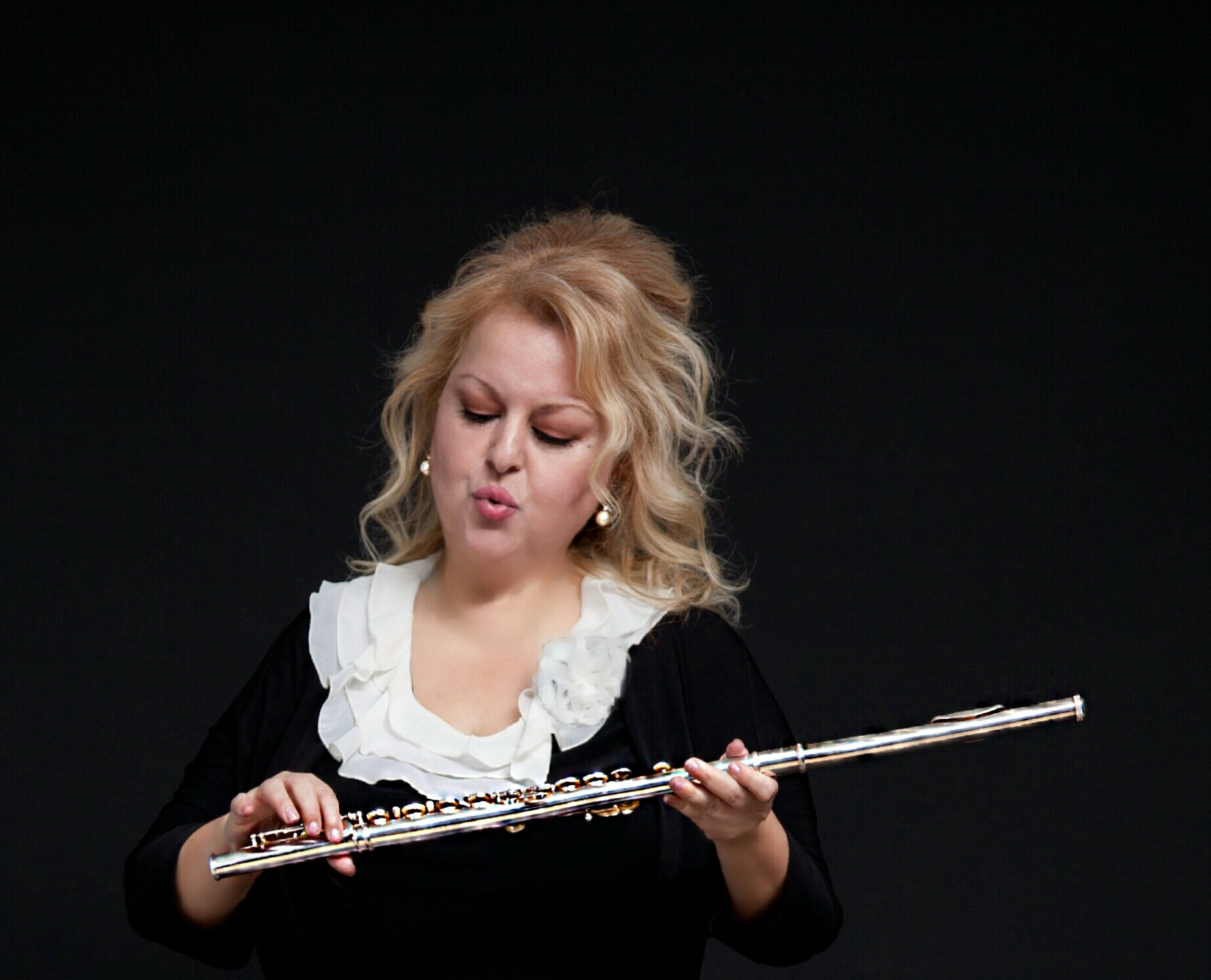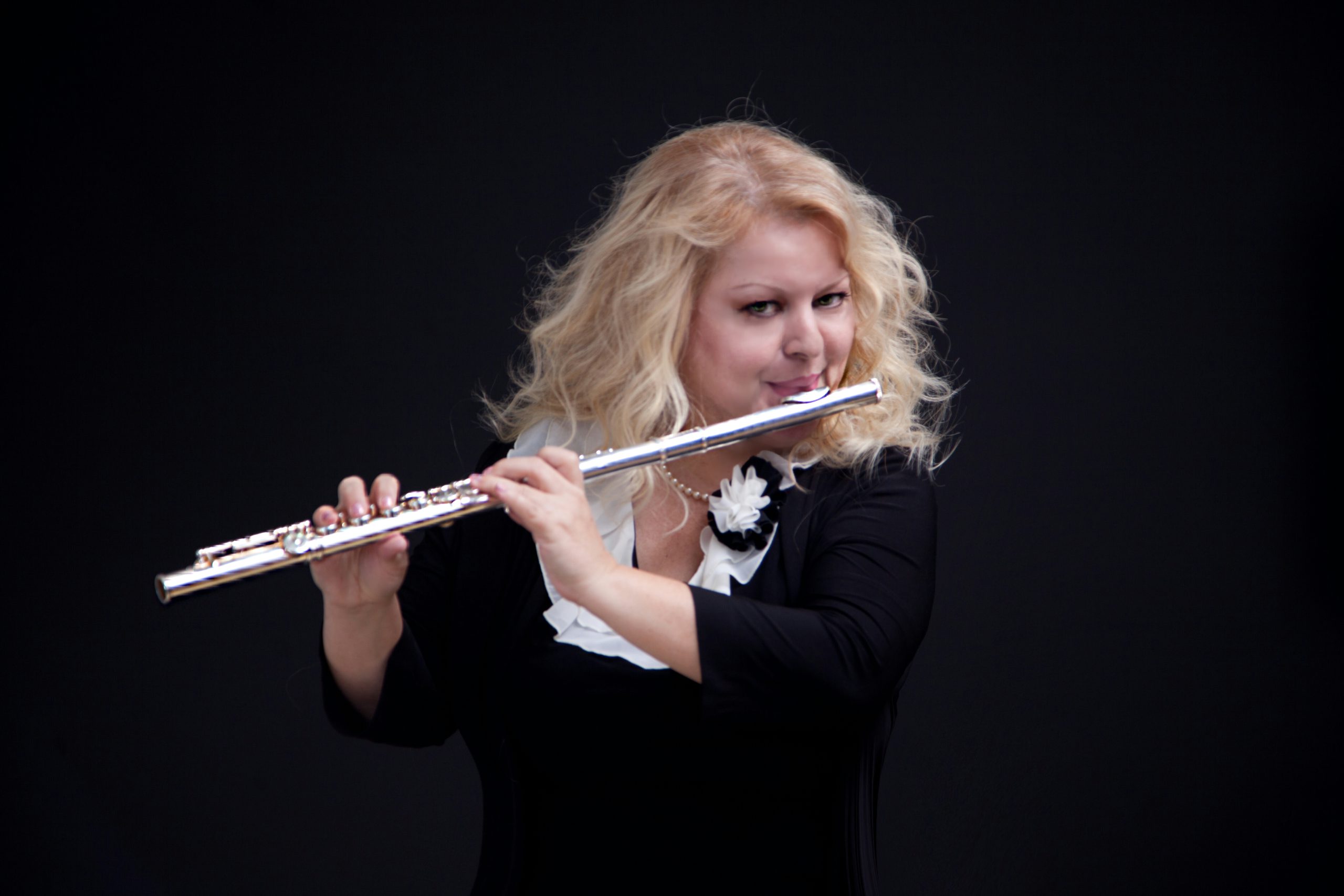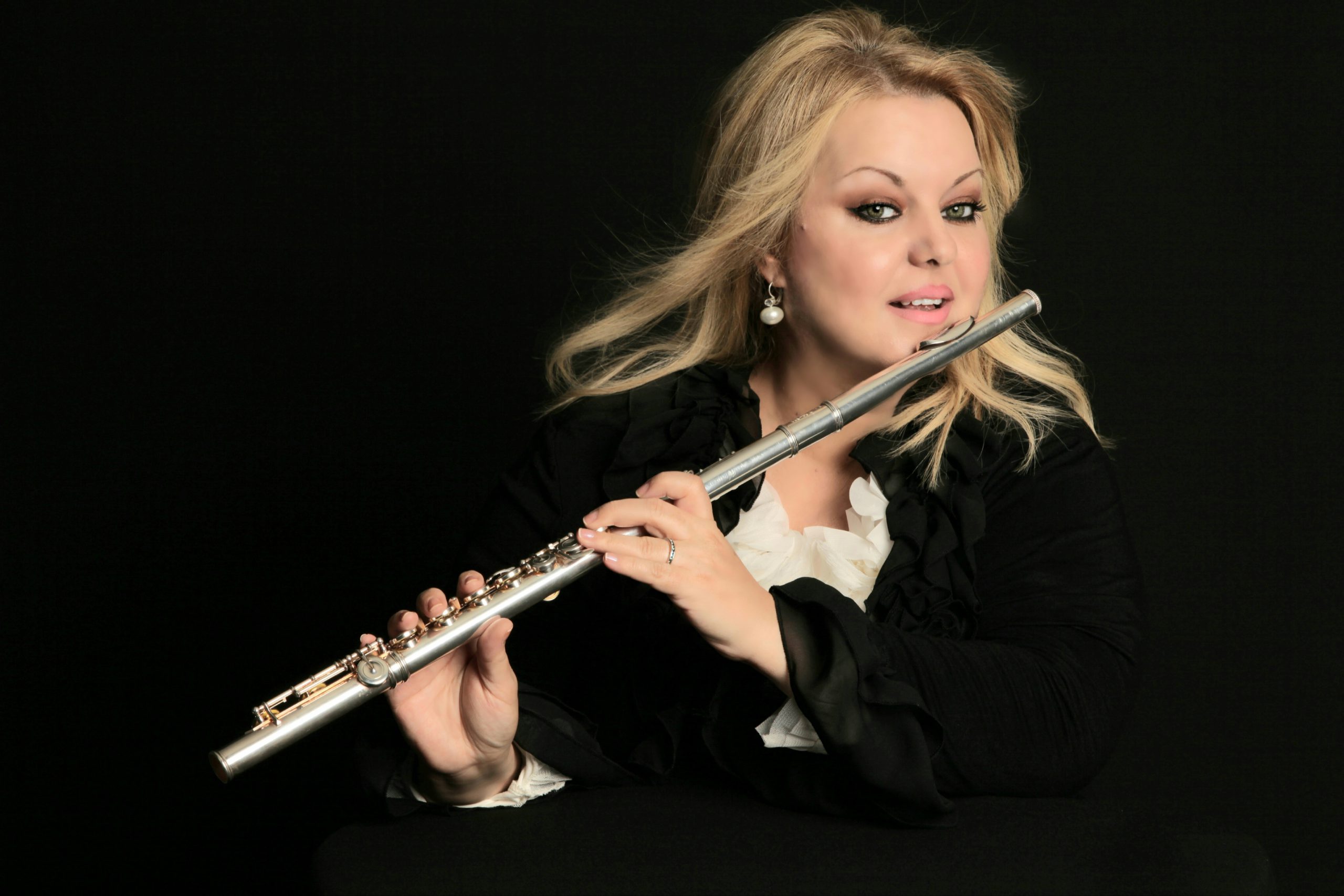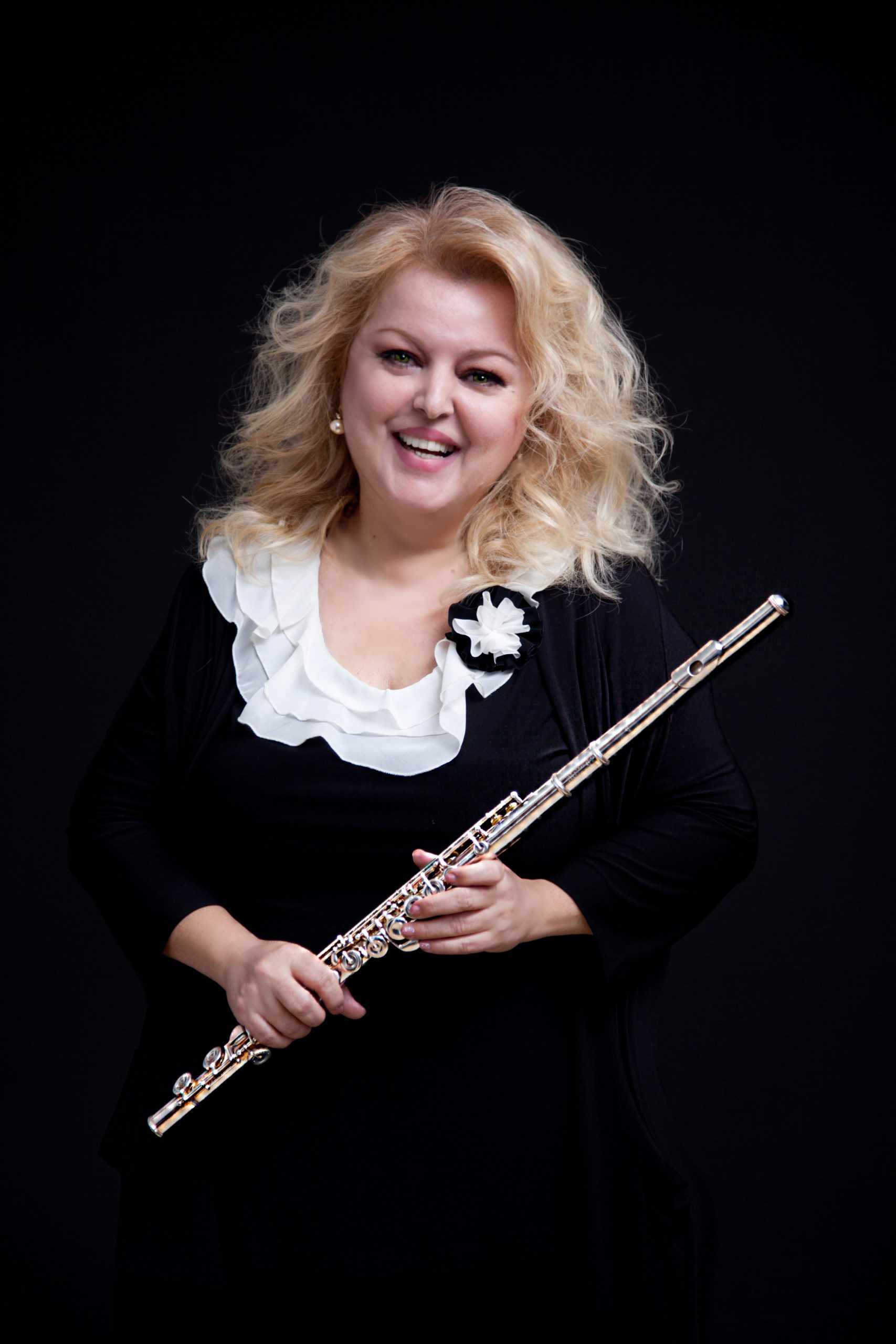

The artist performs in a completely different style than the usual jazz ensembles (in which each instrument shares solos for equal time). With her virtuoso style, her high quality music and her excellent voice, for which she is always praised, she performs in a completely different style than the usual jazz music performances with solo sharing in a group. In the music she performs, she takes on all the difficulties and responsibilities of the music as if she were playing a concerto from beginning to end and performs an uninterrupted and intense solo performance, realizing a "first in Türkiye" in this field and receiving very honorable criticism from world-renowned and important authorities.
“I listen to Mihriban Aviral with great appreciation. I really like her agile technique, musicality and especially her tone of voice.”
“Mihriban Aviral was the first flutist who dared to play my music... When I listened to her, I was amazed by her musical maturity, excellent technique and impressive flute tone. And I wanted to take part in this CD as her producer. It was a great pleasure to work with her.”
She started playing music in elementary school with wooden flutes she bought with her school allowance. Her mother wanted her to play the piano or violin, but her heart was in the flute. From that day on, her only goal was to enter the conservatory and learn flute. During her first years at the conservatory and later in the orchestra, she was very impressed by the flute playing skills of Sir James Galway, a famous virtuoso well known all over the world, and listened to him all the time. Unaware that one day Galway would praise her album, she became his great admirer. This musical journey, which started at the Ankara State Conservatory, continued with the right to join the Presidential Symphony Orchestra after winning the first place exam, and was crowned with an intensive academic music career that continued successfully for many years in countries such as Austria, Italy and Hungary. She took her classical music studies to the next level with academic trainings such as 'Master Class', 'Perfection' and 'Concert Soloist'. She practiced his profession with great love in the Presidential Symphony Orchestra for twenty-five years.
After serving in the Presidential Symphony Orchestra for many years, she suffered a serious lung disease and was separated from his beloved flute for a year. During this period, she met the music of Nestor Torres. After a brilliant comeback and a period of hard work in the orchestra and Latin Jazz studies, she ended her tenure in the orchestra and became the first and only Latin Jazz soloist in Türkiye. While there are only one or two "qualified" examples of this style of music in the world, Mihriban Aviral proudly bears the distinction of being the "first and only" as an important example of "solo flute playing in Latin Jazz style", which has never been realized in our country.

The fact that when Latin Jazz comes together with her academic classical music education and the knowledge she has gained over the years, the result is an extraordinarily beautiful music has been frequently mentioned in her reviews. With her virtuosic style, her high quality music and her flute tone, for which she has always been praised, the artist performs in a completely different style from the usual solo jazz music performances in a group.
In the music she plays, she performs an uninterrupted and intense solo performance like a concerto from beginning to end, breaking new ground in Türkiye in this field and receiving very honorable criticism from world-renowned and important authorities.
The artist, who impresses everyone who listens to her music in a short time, continues to attract great attention with these features in indoor and outdoor Jazz - Latin Jazz concerts within the framework of various festivals and organizations in Türkiye and abroad and in print / visual media.

"When I listened to Latin folk songs in Latin jazz form, I thought, if this is what comes out of Latin folk songs, who knows what can come out of our folk songs. Our folk music is so rich that the folk songs of each of our regions have a different color and beauty. The unity of different cultures always fascinates me. I believe that their unity creates an integrity. Just like a big mosaic...
For me, difference is not a separator, but a privilege, a richness and each one has its own value. Differences add their own value to the formation in which they exist, this is a great cultural richness. Those values should be respected. Therefore, we need to bring our folk songs into universal forms so that other societies can enjoy listening to our beautiful folk songs. This is how I present our folk music to people. 'CanJazzım Türküler' came out of this idea."
M.A.

I believe that I was sent into this world to do this job. I believe this because I don't come from a family of artists. In families, the child of doctor parents "usually" becomes a doctor, the child of lawyer parents becomes a lawyer, this is a learned development. I didn't have that kind of guidance, because there were no artists or musicians in my family. The story started in primary school when my primary school teacher, who was very qualified and had a broad vision, called my mother and guided her. My mother also wanted to play the violin and go to the conservatory in her youth and childhood. But my grandfather didn't allow it at that time, and my mother's conservatory dreams remained very much inside her. But when my mother received such enthusiastic support from my primary school teacher who said, "You should definitely send this child to the conservatory," she motivated me to take the conservatory exams. The stories of buying a wooden flute were only in the 2nd-3rd grade. Everyone would buy chocolates and candies with their pocket money, but I would buy a wooden flute. My mother would say, "My sweetie, where did this come from? Wouldn't it be better if you played the piano or the violin like everyone else?" and she would put the flute away. So I started hiding my purchases from her. After a while, we had to move house. When we moved, we found 8-10 flutes hidden in various places.
When they said, "You passed the exams, which instrument do you want to play?" I said flute. From that moment on, my life was shaped around the flute. I think there must be a reason why I was aimed towards the flute while everyone else chose their instrument with the decision of the teachers. It was the love that came from within me and I was drawn to it and so it went.
I was very impressed with James Galway. His tone is amazing. If 30 people play, without looking, without seeing, just by hearing, I would say that's his tone. I mean, our flute tone is like a fingerprint, no one's is like anyone else's. Even before him, in the older generation, there was Jean Pierre Rampal. I got to know him first when I was a student. One of his words and the words my teacher used to say to us have always stayed with me. "I practice 12 hours a day and I am the best flutist in the world. You practice for 13 hours and you will be better than me."
When I joined the orchestra, I realized that my real education started there. I had learned Sir James Galway. I started listening to him more. I started paying more attention to what he played and how he played it. Then I believed that I needed to improve my flute tone. My tone was good, it was appreciated, but it wasn't enough for me. There is a situation of not being satisfied with what is available, but this is an important thing that takes you forward. You should never say that you are done, that you have achieved...
His mastery!… Mastery!… He plays such difficult things as if they were so easy, that's what mastery is. When I'm building a repertoire, I can't escape to very simple things, it doesn't make me happy. Music with technical and musical difficulties covers most of my repertoire. Making those difficulties so that everyone who listens to the music can enjoy it without realizing what is going on is a masterpiece. Mastery is the work of a person who has studied technique for years, who has blown sound for years, who has become able to handle everything easily. Technique, musicality, elegance, the interpretation of a piece, is related to one's own personality as well as one's knowledge, skills and experience. In other words, you reflect your own personality. If 10 people play the same piece, 10 different interpretations will emerge.
Sir Galway went on a European tour a few years ago. He came to Türkiye, to Ankara, and I rushed to his concert. At that time, I had released my first CD, it had been a year or two. I had my CD with me at Sir Galway's concert to give to one of my students, I had promised to give my CD to my student when we met at the concert. I guess there was a reason why I had it with me. When I told him how Latin jazz came into my life and how I left the orchestra after 25 years to become a soloist, he took a very serious interest in me. Because he himself played flute in the Berlin Philharmonic for a long time and then left the orchestra and continued as a soloist. I think every soloist should have been through an orchestra. Because getting used to making music together can only develop in an orchestra. You get that discipline only in the orchestra. Musicians who work only as soloists are not always as good at orchestral accompaniment as an orchestrator. Sometimes there are such situations that the soloist takes off and the orchestra tries to catch up with him. But an artist who comes out of the orchestra can make music by fully looking out for his surroundings because he/she has received this discipline, this training. This is a positive thing that relaxes both the orchestra and the conductor. I think that's why Sir Galway took a more serious interest in me. I released my CD, but I said it was jazz music, Latin jazz. He said, "Is that so?" "I love it very much." and said, "Are you giving it to me? I said, "Yes." I planned it for my student, but it ended up for Sir Galway. He put it in the inside pocket of his jacket and he said, "I'll listen to it." So I thought, on a long tour, the CD would probably stay in the pocket of that jacket. About a month passed. One day he found me on Facebook and wrote a message. "I listened to your CD, I liked it very much, congratulations. It's a very nice CD that everyone should have." It was really kind of him to give such a feedback to a flutist he had just met during a long tour by listening to his music. It's really not easy to be in an orchestra and to be able to continue for 25 years. But I was very lucky, I lived through the orchestra's heyday. The period before me had very limited means. When I entered the orchestra, we were receiving huge state support, which meant the opportunity to bring in the world's best conductors and the best soloists. As such, I worked with all kinds of famous conductors and famous soloists you can think of. I made music with them, I learned a lot from them, I had conversations with them. I lived through the orchestra's heyday and got that taste. When the situation at that time changed and the orchestra continued with more limited budgets, unfortunately the qualifications of the foreign conductors and soloists also changed. As I said, I am a person who does this job with love, I cannot be happy if it turns into a mere job. If what I do doesn't give me satisfaction, why should I do it? This question in my mind and my new excitement at that time, jazz & Latin jazz music, brought me the decision to leave the orchestra. For a while I tried to do both, but it was not possible. There were orchestra rehearsals every day, concerts two nights a week and my Latin jazz project concerts on the other side. The difficulty of symphony orchestras is this; every week the program changes, the conductor, the soloist, everything changes. So every week you study and learn the new program again. You have to pay close attention all the time, you have to devote a lot of time.
In the old years CDs were used and there was nothing new for me. It was very difficult to find CDs in Türkiye back then. When we went on tours abroad, I always collected CDs and brought them back. One time I saw a different flute CD. The CD was Latin jazz music by the Grammy-winning flutist Nestor Torres. It wasn't classical music, it sounded interesting, so I decided to buy it. I listened to it and it was very different and beautiful music, but at that time I didn't have much time to be interested in different music. Later, when I had the opportunity, that CD was my first choice to listen to. The more I listened, the more I liked it. The more I liked it, the more I listened to it and the more I liked it. At that time, this music affected me a lot. But this music is really something else, I mean there is enthusiasm, there is joy of life, in short, it is great.
A lot of time passed and I started to like these pieces very much. As I started to like them, I wanted to play them. I sat down and listened to five of his pieces one by one and notated them. Then I had the infrastructure made in a studio and started to play them live. Copyrights were just starting to become effective in Türkiye at that time. I corresponded with him about the copyright and that's how we became acquainted. "Can I listen to you? I'm very curious. No one has played my music for me before, my music is very difficult and no one has dared to play it. Let's have a Skype call if possible". We had a Skype call and I played it. He said, "I am very impressed, what do you mean permission, let's make you a CD". "I would like to be your producer too". He said, "Your technique is very good, your flute tone is very good, the musicality is perfect". So he came here. We recorded 11 tracks in four days in Istanbul. When I told him that I wanted to sing a duet with him, he wrote a beautiful duet. When he asked me to name the track, I decided on "Latin Dream's in Istanbul" because we came together in Istanbul.